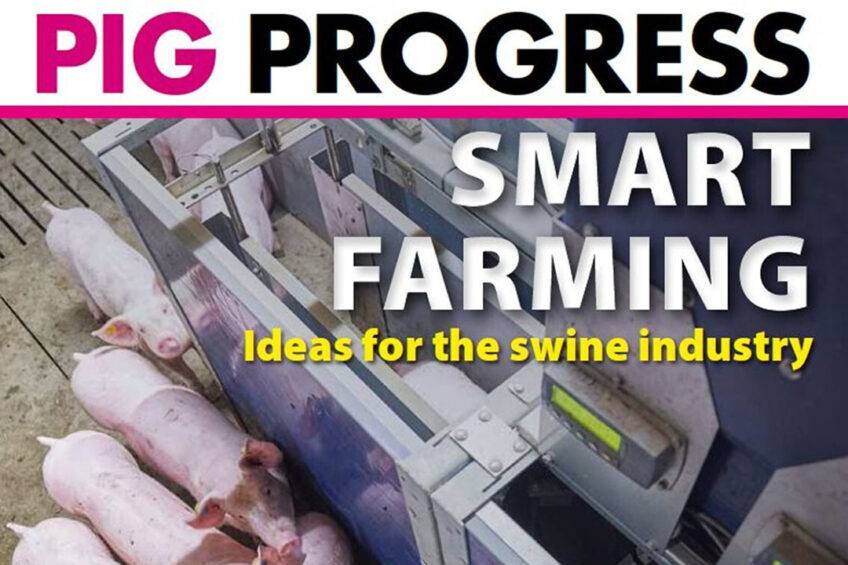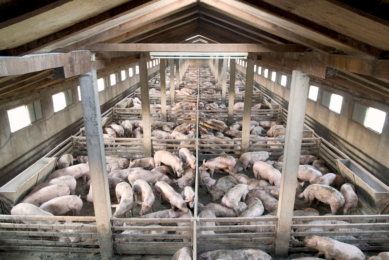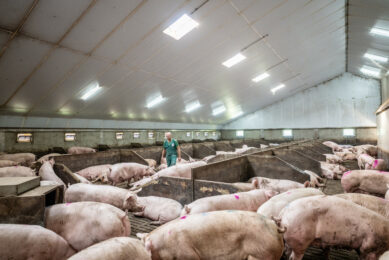Heat stress and smart farming in Pig Progress 5

The 5th edition of Pig Progress for 2021 is now available online. This edition highlights smart farming ideas for the swine industry and looks at the challenge of heat stress in pigs, which is best tackled with a range of solutions revolving around animal and environmental management and supplemented by a nutritional strategy.
View Pig Progress digital magazine
Heat hampers pig production in East Africa
Rising temperatures and higher humidity will occur more frequently and for longer periods in East Africa. The resulting heat stress experienced by the pig population could make much of East Africa unsuitable for pig production, as reported by correspondent Natalie Berkhout on pages 6-7.
How betaine affects the gut of weaning piglets
This article, authored by Orffa’s Lien Vande Maele on pages 12-14 focuses on the role of betaine, a naturally occurring compound, as a feed additive to support gut health in weaning piglets.

Amino acids to overcome heat stress problems
Nutritional strategies can help to mitigate the negative effects of heat stress in pigs. Researchers recently conducted 2 experiments to determine the effect of amino acids on nutrient utilisation and growth of heat-stressed pigs. See the details and the results in an article by John Htoo of Evonik on pages 12-13.

Heat stress is not only an environmental issue
The complex challenge of heat stress is best tackled with a range of solutions revolving around animal and environmental management and supplemented by a nutritional strategy. Francesc Payola and Morgane Piriou of Wisium explain on pages 14-15.

Column: Market uncertainty and risk
In this column on page 16, Dr Casey Bradley discusses grain and feed input prices and availability as well as feed additives for the pig farmer. Nutritional strategies, she says, need to change and adapt to market conditions.
Robust weaned pigs start with optimal haemoglobin
Ensuring pigs have an optimal haemoglobin level at weaning is one of the best ways to raise a healthy, resilient pig. Read more in a contribution by Chris Olsen of Pharmacosmos on page 17.

Bringing circular pig production a step closer
On a visit to a pig cooperative, Zonvarken (“Sun Pig”), in the east of the Netherlands, circular pig production is one step closer. Animal welfare, climate and job satisfaction are the spearheads of this new concept, as detailed in an article by reporter Anne-Marie van der Linde on pages 18-20.

The return of WPX: Optimism abounds
Although the World Pork Expo (WPX) was cancelled in 2019 due to ASF, and then again in 2020 due to the Covid-19 pandemic, the 2021 show attracted thousands of participants. On behalf of Pig Progress, correspondent Darcy Maulsby took a look. Read the review on pages 22-24.

Italy gains international interest with ClassyFarm
Attracting international attention is a new integrated IT system known as ClassyFarm, which has been developed by the Italian ministry of health for risk analysis of livestock farms. Marcello Marchesi has the details on page 27.

Sow feeding affects piglet performance
Research in Northern Ireland has investigated the growth response of low and average birth weight piglets when reared on sows offered different levels of lactation feed intake. The article by correspondent Chris McCullough on pages 28-29 presents the results.

Smart farming ideas for the swine industry
Smart farming emerged from the need to inform farmers frequently and in detail about the health, welfare and productivity of their animals. This article on pages 30-31, authored by a team of scientific authors including Dr Samaneh Azarpajouh, looks at what is currently available and what can be expected.

Column: Free farrowing pens
Columnist Dr Irene Camerlink discusses free farrowing crates and raises some interesting points on page 34. She notes that, according to research, higher growth rates in such systems are achieved.











